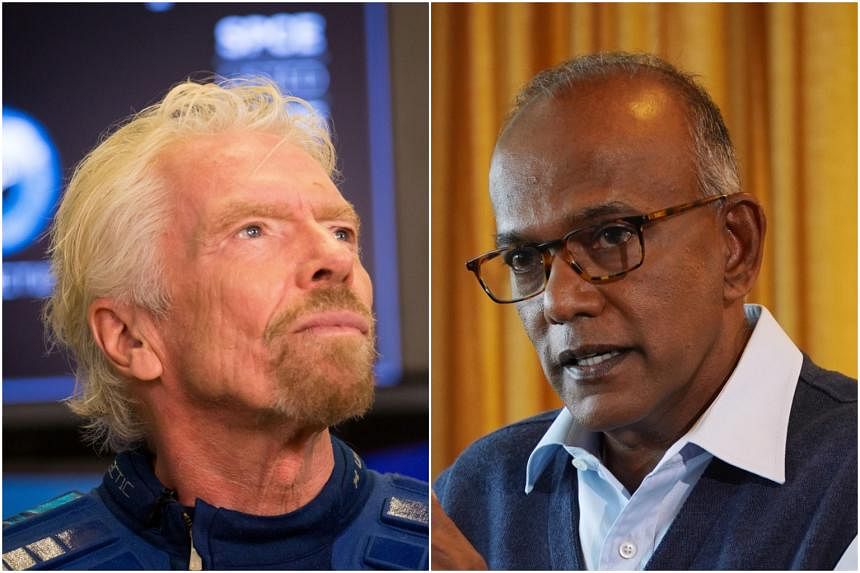SINGAPORE – British billionaire Richard Branson has declined Singapore’s invitation to participate in a live televised debate with Law and Home Affairs Minister K. Shanmugam.
In a statement issued on Monday, he said he is declining the invitation as he feels a debate on such a platform will lack nuance.
“I have decided to decline this invitation. Here is why: A television debate – limited in time and scope, always at risk of prioritising personalities over issues – cannot do the complexity of the death penalty any service,” he said.
“It reduces nuanced discourse to sound bites, turns serious debate into spectacle. I can’t imagine that is what you are looking for. What Singapore really needs is a constructive, lasting dialogue involving multiple stakeholders, and a true commitment to transparency and evidence.”
In his statement, issued on his blog on the website of his Virgin Group conglomerate and disseminated on his Facebook and Twitter accounts, he added that the conversation needed local voices.
The Ministry of Home Affairs (MHA) previously rebutted his Oct 10 blog post that said the Singapore Government “seems bent on executing scores of low-level drug traffickers, mostly members of poor, disadvantaged minorities”.
Mr Branson said Malaysian Nagaenthran K. Dharmalingam was hanged in April for drug trafficking despite having “a well-documented intellectual disability”.
MHA said the psychiatrist called by Nagaenthran’s defence had agreed in court that he was not intellectually disabled, and that the ministry had clarified on several occasions that Nagaenthran knew what he was doing and was not intellectually disabled.
It said on Oct 22 that Mr Branson also made false assertions about alleged racial bias here and the treatment of capital defence lawyers.
The ministry said the capital sentence has had a clear deterrent effect on drug traffickers in Singapore and has helped prevent major drug syndicates from establishing themselves in the city state.
It cited the reduction in quantity of opium and cannabis trafficked into Singapore since the mandatory capital sentence was introduced for such drugs.
For instance, there was a 66 per cent drop in the average net weight of opium trafficked into the Republic within four years of the sentence being introduced in 1990.
The Government had invited Mr Branson to debate the death penalty on live TV in Singapore with Mr Shanmugam, saying that the Briton’s flight to and accommodation in the Republic would be paid for.
“Mr Branson may use this platform (of a televised debate) to demonstrate to Singaporeans the error of our ways and why Singapore should do away with laws that have kept our population safe from the global scourge of drug abuse,” MHA had said.
In his response on Monday, Mr Branson said he has “enormous respect” for Singapore and Singaporeans, and is compelled to speak out “when I see things go as horribly wrong as Singapore’s use of the death penalty”.
Instead of a television debate, the Government should engage Singaporean stakeholders, he said. He called on the Government to engage anti-death penalty advocates, lawyers and journalists, and cited groups like the Transformative Justice Collective as well as Mr M. Ravi, who was Nagaenthran’s lawyer.
Mr Branson said that as a “global advocate for abolition of the death penalty”, he will continue to raise the issue and will celebrate if Singapore does abolish it.
He also claimed there is no evidence that the death penalty reduces crime.
“There is no evidence to support its continued existence. Just ask those in Singapore who know,” he said.
Minister for Communications and Information Josephine Teo said last Saturday that the Government will remain steadfast in its tough approach against drug trafficking, including the use of the death penalty.
Mrs Teo, who is also Second Minister for Home Affairs, said that the death penalty is an effective deterrent, and interviews with drug traffickers and analysis of their operations show that the death penalty has significantly reduced the amount of drugs trafficked into Singapore.
Surveys conducted or commissioned by the MHA also show that six in 10 Singaporeans think drug traffickers should be sentenced to death, and people living in the region agree that the death penalty has a deterrent effect. Mrs Teo said: “Some people, however, make the disingenuous argument that because drugs are still being trafficked into Singapore, it shows that the death penalty has failed as a deterrent. It’s an illogical argument, but they will grasp at any argument.”


